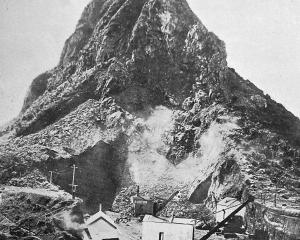
Local man Don Sinclair told the Otago Daily Times yesterday he had never seen gravel banks in the river passing through Balclutha looking so prominent.
Mr Sinclair said he and others, who had lived locally for decades, had seen what the river could do in flood, and believed flood risk had worsened since gravel had stopped being removed from the riverbed several years ago.
"I remember there was a big flood around 1957, when the town flooded and, following that, the authorities used a massive drag line to haul the gravel out and use it for roading and cement.
"I don’t know why they stopped cleaning it out, but each year in summer you see the banks building up more and more when the flow exposes them, and it’s getting to the point where someone could near enough walk across now."
During its safety and resilience committee meeting in Dunedin last Thursday, the Otago Regional Council said it had commissioned an independent report on the situation from Niwa.
ORC natural hazards manager Dr Jean-Luc Payan said the report was expected "imminently", and would inform the council what, if any, remedial action might be necessary.
"ORC is aware of concerns from community members that bed levels may be building up, particularly in the Balclutha township area, and the potential impact on flood hazard. The scope of the investigation is to compare and analyse all known survey data for the Clutha River in the vicinity of Balclutha to provide a comprehensive review of bed level trends. The effects of riverbed changes on water levels and flood hazard will also be assessed."
Mr Sinclair welcomed the report, saying he hoped it would lead to a resumption of regular gravel removal from the area.
"You have to get the gravel cleared out while you can, because by the time the flooding hits, it’s too late. The stopbanks are full of rabbit holes, so it won’t take much before we see the town underwater again, in my opinion."
Clutha District Mayor Bryan Cadogan said riverbed gravel was a perennial topic of concern for locals.
"It’s probably a once-a-month regular subject raised in conversation with residents, so I’m glad an independent report is being prepared.
"Let’s get some rigour in the process and see what the science says."












